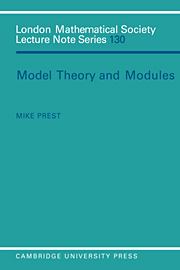Book contents
- Frontmatter
- Contents
- Introduction
- Acknowledgements
- Notations and conventions
- Remarks on the development of the area
- Section summaries
- Chapter 1 Some preliminaries
- Chapter 2 Positive primitive formulas and the sets they define
- Chapter 3 Stability and totally transcendental modules
- Chapter 4 Hulls
- Chapter 5 Forking and ranks
- Chapter 6 Stability-theoretic properties of types
- Chapter 7 Superstable modules
- Chapter 8 The lattice of pp-types and free realisations of pp-types
- Chapter 9 Types and the structure of pure-injective modules
- Chapter 10 Dimension and decomposition
- Chapter 11 Modules over artinian rings
- Chapter 12 Functor categories
- Chapter 13 Modules over Artin algebras
- Chapter 14 Projective and flat modules
- Chapter 15 Torsion and torsionfree classes
- Chapter 16 Elimination of quantifiers
- Chapter 17 Decidability and undecidability
- Problems page
- Bibliography
- Examples index
- Notation index
- Index
Chapter 10 - Dimension and decomposition
Published online by Cambridge University Press: 15 December 2009
- Frontmatter
- Contents
- Introduction
- Acknowledgements
- Notations and conventions
- Remarks on the development of the area
- Section summaries
- Chapter 1 Some preliminaries
- Chapter 2 Positive primitive formulas and the sets they define
- Chapter 3 Stability and totally transcendental modules
- Chapter 4 Hulls
- Chapter 5 Forking and ranks
- Chapter 6 Stability-theoretic properties of types
- Chapter 7 Superstable modules
- Chapter 8 The lattice of pp-types and free realisations of pp-types
- Chapter 9 Types and the structure of pure-injective modules
- Chapter 10 Dimension and decomposition
- Chapter 11 Modules over artinian rings
- Chapter 12 Functor categories
- Chapter 13 Modules over Artin algebras
- Chapter 14 Projective and flat modules
- Chapter 15 Torsion and torsionfree classes
- Chapter 16 Elimination of quantifiers
- Chapter 17 Decidability and undecidability
- Problems page
- Bibliography
- Examples index
- Notation index
- Index
Summary
“Finiteness” conditions on the lattice of right ideals of a ring correspond to structure theorems for the injective modules (see §1.1). In this chapter, we look at finiteness conditions on the lattice of pp-types which correspond to structure theorems for pure-injective modules. We have already seen one example in Chapter 3: the descending chain condition on pp-definable subgroups is equivalent to every pure-injective module being a direct sum of indecomposable submodules. In §4.6 we were able to develop a structure theory for such modules.
One of the conditions that we consider turns out to be equivalent, at least over countable rings, to there being no continuous pure-injectives (an example of a “good structure” theorem). Also considered is a stronger condition, under which there is a good structure theory for the pure-injective models, analogous to that in §4.6.
If one considers the proof of 3.14, then one sees that the point is that, under the assumed finiteness condition, every pure-injective model has an indecomposable direct summand. In the first section, we see that a very much weaker hypothesis suffices for that conclusion.
The finiteness conditions of §1, though sufficient to imply zero continuous part, are far from necessary. In fact, each is just the basis for an inductively defined sequence of finiteness conditions. For example, one may, in some sense, factor out that part of a theory which has the dec. It is possible that, in what remains, there is some non-trivial part which has the dec – in which case factor it out; and so on.
- Type
- Chapter
- Information
- Model Theory and Modules , pp. 201 - 227Publisher: Cambridge University PressPrint publication year: 1988



